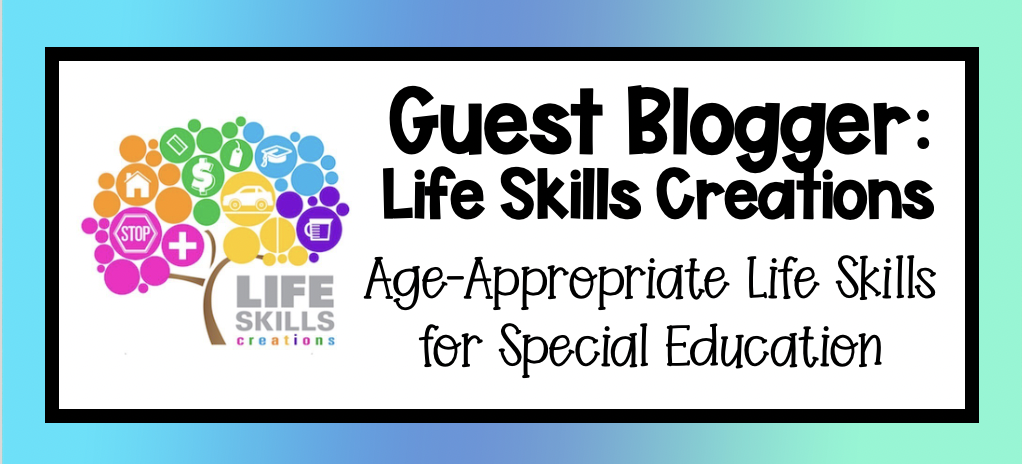I am excited to introduce this week’s guest blogger, Life Skills Creations to explain all about the importance of age appropriate life skills!

As a secondary special education teacher, I work with teenage students in the areas of english, math, and life skills. The high school setting provides me with a unique opportunity to help these kids. Essentially, transition into adults throughout their stay with me. I place a major emphasis of my instruction on functional life skills that my students will need in the real world.
Doing things like writing essays or solving for variables in not appropriate for my learners. My students work on drafting professional emails, measuring ingredients for recipes, writing resumes, creating budgets, and much more. By providing age-appropriate learning opportunities, I have noticed that my students are so much more motivated. They want to engage and learn from the material that is being taught to them.
At the beginning of each school year, I like to map out a scope and sequence that helps me plan for functional lessons that are important to cover in my classes. You can see the scope and sequence guides I use by CLICKING HERE.
I try to break the extensive list of topics into three main classes: math, english, and life skills. Some functional life skills I work on in math include menu math, simulated shopping experiences, measuring, and so much more.
In english, we practice addressing envelopes, writing thank you cards, sending emails, filling out forms and so much more. For life skills, we review things like reading recipes, making meals, using technology, simulated online shopping experiences, laundry, job skills, and much more.
The goals the IEP team determines for the student continue to be functional and age-appropriate in nature. I administer sections of this IEP Data Tool that are relevant for the student and his/her unique needs. Some students prefer a digital option and you can find that one by Clicking Here.
Over the years, I have created a database of goals. I like to reference this when brainstorming ideas for functional goals with the IEP team. You can see the goal bank that I use by Clicking Here. These goals all are relevant to the skills students will need to lead an independent life outside of our classroom walls.
Always remember, that although these goal banks are great to reference, continue to make sure the goals you pick are individualized and representative of the specific needs that each student in your class has.
It is important that we, as educators, emphasize to our students the why behind what we teach. By providing students with the reasoning behind the choices for our curriculum, we can empower them to understand the importance of these skills once they graduate from school. Teaching the quadratic equation isn’t that relevant to everyday life, but you know what is?
Making a recipe correctly, learning how to place an online order, mailing a package at the post office, understanding the steps to get a job, and so many more of these types of real world skills. Motivation and engagement are a key component of learning. By making learning meaningful, we can continue to make a difference in students’ lives for years to come.
Age-appropriate life skills are an essential component of special education, as they empower students with the necessary tools to lead independent and fulfilling lives. These skills encompass various domains, including personal hygiene, self-care, household tasks, communication, and social interactions. By teaching age-appropriate life skills, special education teachers equip their students with the knowledge and confidence to navigate everyday situations and promote their overall well-being.
Read more about age appropriate life skills!
What are you looking for?
COPYRIGHT © 2025 Full SPED Ahead